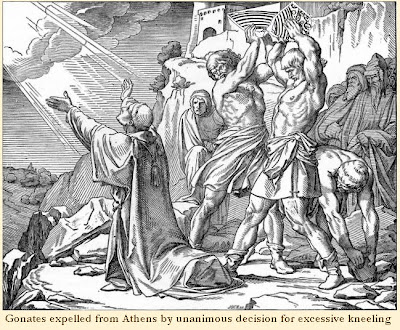Ostrakismos was a procedure used in the Athenian democracy, by which any citizen of the city-state could be expelled for a period of ten years, for reasons as varied as thievery, bestiality, excessive use of the word coccyx, poor penmanship, and halitosis. The potsherds referenced in the word were used as a kind of secret ballot, on which all of the ancient Athenians could record a vote of “yay” or “nay” regarding the expulsion, though some who did not wish their opinions to remain secret had the option of throwing their potsherd directly at the person facing expulsion. This was known as a “strong yay.”
According to Jephson’s account, one custom he had observed among several tribes involved an individual who had brought shame to his family, who was ceremoniously placed upon an ostrich and cast out into the desert. In cases where a whole family brought shame to the village, a special cart was constructed and attached to the ostrich, thus allowing the whole family to be, as Jephson put it, ostrich-ized. This custom appealed to Jephson greatly, and he wrote about it at length, even going so far as to suggest that it would be “an appropriate and befitting solution to the pressing issue of what is to be done with Gilbert and Sullivan, and others of their ilk.” When he returned to Europe he even attempted to start an ostrich-cart taxi service, but his business model soon collapsed with the advent of the horseless carriage.




